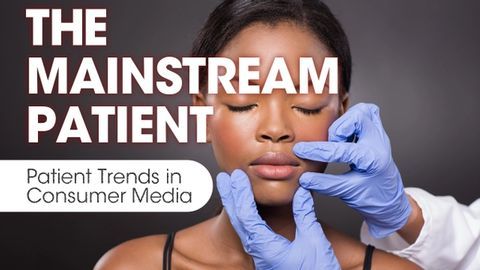- Case-Based Roundtable
- General Dermatology
- Eczema
- Chronic Hand Eczema
- Alopecia
- Aesthetics
- Vitiligo
- COVID-19
- Actinic Keratosis
- Precision Medicine and Biologics
- Rare Disease
- Wound Care
- Rosacea
- Psoriasis
- Psoriatic Arthritis
- Atopic Dermatitis
- Melasma
- NP and PA
- Skin Cancer
- Hidradenitis Suppurativa
- Drug Watch
- Pigmentary Disorders
- Acne
- Pediatric Dermatology
- Practice Management
- Prurigo Nodularis
- Buy-and-Bill
Article
The Mainstream Patient: April 24
Author(s):
This week's edition of the Mainstream Patient features stories about addictive behaviors stemming from skin care culture, the 21 best hyaluronic acid serums, and the struggles behind finding the right vitiligo treatment.

New this week: Allure considers addictive behaviors in skin care culture and Elle lists 21 of the best hyaluronic acid serums. NewBeauty discusses skin streaming with dermatologists and Byrdie reveals dermatologists' advice for properly shaving your legs. Women's Health gives an overview of using aloe vera for healthy hair and Self takes a deep dive into the struggles of living with vitiligo.
Skin-Care Culture Can Be Fuel for Addictive Behaviors
"For more than a decade, the subreddit r/SkincareAddiction has attracted skin-care devotees from all over the web. Its 1.8 million members include amateurs and professionals, offering everything from tretinoin tips to wholesome memes and product hauls. There’s a positive community aspect to the forum, where online friendships can be formed based on something as simple as a dupe for a discontinued 'holy grail' item. It also serves as a completely free (though not always accurate) resource guide for anyone looking to dive into an overwhelming world of intimidating-sounding ingredients to build an effective personal routine."
21 Hyaluronic Acid Serums for Radiant Skin Year-Round
"A close look at the name will tell you all you need to know about the popular ingredient: retaining moisture is its primary goal. 'Serums are low viscosity, thinner liquids that are typically formulated to be used under a moisturizer. Hyaluronic acid is a humectant,' Dr. Camille Howard, NY-based dermatologist and founder of Girl+Hair, tells ELLE.com.
Should I Be Skin Streaming?
"While skin streaming is a recent trend, experts say it’s a long-term practice that patients have been implementing for years. Miami dermatologist Dr. Deborah Longwill describes skin streaming as “cleaning out the fluff from the regimen,” thereby creating a simpler, more effective routine. “Over the past few years, so many of my clients have been inundated with product recommendations via the internet and especially social media,” says celebrity facialist Gina Mari. She tells her clients that often less is actually more when it comes to skin care."
How to Shave Your Legs Properly, According to Dermatologists
"For some of us, shaving our legs is part of our regular body care routine. It's the quickest and most affordable way to remove unwanted hair compared to alternatives like waxing or laser hair removal. But do you actually know how to shave properly? Spoiler: If you're constantly dealing with itchiness, razor burn, ingrown hairs, and nicks, the answer is likely no. But luckily, there are plenty of expert-approved tips and tricks that will help you achieve a smooth, irritation-free shave every time. Ahead, board-certified dermatologists Brendan Camp and Marisa Garshick break down how to shave your legs."
Everything You Need To Know About Using Aloe Vera For Hair, According To Dermatologists
"Aloe vera is one of those do-it-all ingredients that tons of people rave about. The plant's gel can be found in most personal care products, from lotions to shampoos, conditioners, serums, ointments, and more, likely because it's historically been used to treat acne, sunburns, wounds, and even constipation since it's a natural laxative."
The Winding Journey to Finding the Right Vitiligo Treatment
"Like many other chronic health conditions, vitiligo is often misunderstood—and due to the visible symptoms it causes, it’s undeniably stigmatized. Vitiligo is a chronic autoimmune condition that causes areas of a person’s skin to lose color. There is no cure for vitiligo, but there are treatment options that can help restore lost skin color, stop the depigmented patches and spots from getting bigger, and prevent new areas of lost pigment from forming, according to the American Academy of Dermatology (AAD). Every person with vitiligo has a different experience—and that can make finding the right treatment challenging."


